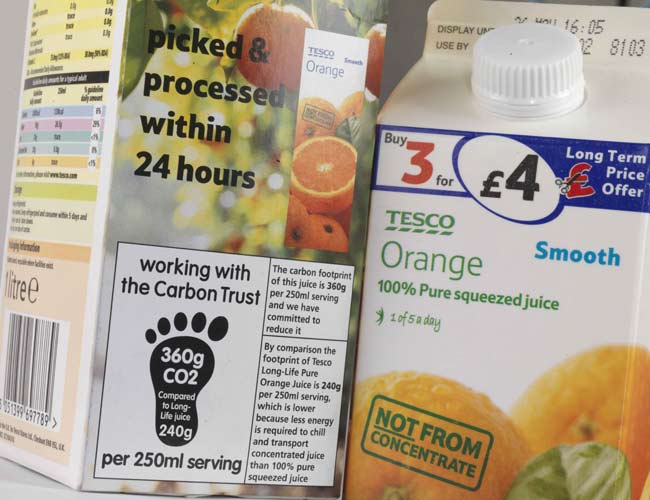How Food Labels Could Power the Future

Get the world’s most fascinating discoveries delivered straight to your inbox.
You are now subscribed
Your newsletter sign-up was successful
Want to add more newsletters?

Delivered Daily
Daily Newsletter
Sign up for the latest discoveries, groundbreaking research and fascinating breakthroughs that impact you and the wider world direct to your inbox.

Once a week
Life's Little Mysteries
Feed your curiosity with an exclusive mystery every week, solved with science and delivered direct to your inbox before it's seen anywhere else.

Once a week
How It Works
Sign up to our free science & technology newsletter for your weekly fix of fascinating articles, quick quizzes, amazing images, and more

Delivered daily
Space.com Newsletter
Breaking space news, the latest updates on rocket launches, skywatching events and more!

Once a month
Watch This Space
Sign up to our monthly entertainment newsletter to keep up with all our coverage of the latest sci-fi and space movies, tv shows, games and books.

Once a week
Night Sky This Week
Discover this week's must-see night sky events, moon phases, and stunning astrophotos. Sign up for our skywatching newsletter and explore the universe with us!
Join the club
Get full access to premium articles, exclusive features and a growing list of member rewards.
Editor's Note: Each Wednesday LiveScience examines the viability of emerging energy technologies — the power of the future.
Food labels generally alert us to the unhealthy bits in the food we eat. Now, supermarkets around the world are expanding the approach by adding labels that warn of the environmentally unhealthy bits in the food we buy.
Many consumers are already familiar with energy efficiency ratings on dishwashers and light bulbs, so it is not that surprising to see the trend reaching down grocery aisles.
"There's savings to be found for every product," said Euan Murray of the Carbon Trust in London.
The Carbon Trust is a non-profit organization started by the UK government to help companies reduce their carbon footprints. Over the past three years, Carbon Trust has been partnering with a supermarket chain and a number of food providers to develop carbon-reduction labels.
Instead of saying how much trans fat or sugar is in each serving, these little stickers reveal the quantity of greenhouse gas (GHG) emissions that went into the making, packaging, transporting and (eventually) disposing of a given product.
"It helps to get consumers engaged and improves their literacy on these topics," Murray told LiveScience.
Get the world’s most fascinating discoveries delivered straight to your inbox.
Carbon burger
The environmental impact of food is a topic on a lot of people's minds lately.
Earlier this year, Rajendra Pachauri, the Nobel Peace Prize recipient and chair of the U.N. Intergovernmental Panel on Climate Change, recommended giving up meat for one day a week.
"In terms of immediacy of action and the feasibility of bringing about reductions in a short period of time, it clearly is the most attractive opportunity," Pachauri, a vegetarian, told The Observer newspaper in Britain.
A 2006 U.N. report estimated that livestock farming accounts for 18 percent of the world's GHG emissions. This is more than the output from transportation, which accounts for 13 percent.
One explanation for this is the higher warming effect of certain agriculture emissions. Fertilizers release nitrous oxide (296 times more potent than CO2), and animal digestion by-products are major sources of methane (23 times more potent than CO2).
What can all this add up to? Writer and futurist Jamais Cascio, on his Web site "Open the Future," has estimated the total carbon footprint of a single cheeseburger to be roughly 4,350 grams of greenhouse gases. This is the equivalent emissions of driving about 10 miles in an average car.
Add together all the cheeseburgers and other meat products that the average American eats in a year, and this is like driving an extra 8,000 miles compared to a strictly vegetarian diet, according to a recent report by Carnegie Mellon University researchers.
Apples vs. oranges
Although everyone might agree that the environmental impact of broccoli is less than a burger, there are some choices that are not so easy.
For instance, a lot of focus has been on food miles, i.e. the distance that a product travels to the store. However, the same Carnegie Mellon report showed that distribution accounts for only 1 percent of the GHG emissions for red meat, and 11 percent for fruits and vegetables.
"So much conventional wisdom is out there, but a lot of it is wrong," Murray said.
This can complicate one's decision between a locally grown apple and an orange shipped in from 1,000 miles away.
"You can fit a lot of oranges in a container ship," Murray observed.
And speaking of oranges, some people might be surprised to hear that freshly squeezed orange juice in a carton has a bigger carbon footprint (360 grams of GHG emissions per 250 milliliter serving) than juice from concentrate (260 grams).
Labels can help consumers sort out all the various factors in a carbon footprint.
Coming to a supermarket near you
Participation in the Carbon Trust's labeling scheme — as well as in a proposed program in California — is purely voluntary. Murray thinks mandatory labels may not be necessary, since consumers themselves are asking for carbon labels.
"Companies are waking up to the idea that this is good business," he said.
And not just in the United Kingdom. Earlier this year, a French supermarket chain announced that it would include footprint labels on some of its products, and the Carbon Trust is also in negotiations with undisclosed companies in the United States.
 Live Science Plus
Live Science Plus











